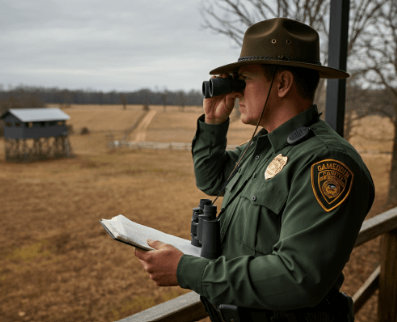Game wardens play a critical role in enforcing wildlife laws, but their authority often raises questions, particularly around private property rights. Under the Open Fields Doctrine, game wardens in many states are legally allowed to enter private property without a warrant if they suspect wildlife violations. For example, states like Florida grant wardens the power to access private land, even if it’s marked with “No Trespassing” signs, making property owners wonder, “Can game wardens go on private property?” However, some states like Montana and Vermont have ruled these warrantless searches unconstitutional, offering more protection to landowners. Understanding these laws is crucial if you’re considering buying or selling land. Steve Daria and Joleigh, leading real estate investors and cash land buyers, can provide expert insight into navigating these complexities while protecting your rights. Can game wardens go on private property? Knowing your rights and understanding state-specific laws is the first step. Book a free discussion with Steve and Joleigh today to make informed decisions about your land investments!
Key Points
- The Open Fields Doctrine: This allows game wardens to enter private property without a warrant in many states if they suspect wildlife violations. This rule does not apply to homes but does extend to lands commonly used for hunting or fishing.
- State-Specific Laws Vary: Some states, like Florida, permit game wardens to access private property even if marked with “No Trespassing” signs. However, places like Montana and Vermont have ruled such actions unconstitutional, providing stronger protection for landowners.
- Role of Game Wardens: Game wardens enforce fish and wildlife laws to protect natural resources. Their work often requires quick action, so they are sometimes granted unique authority compared to other law enforcement officers.
- Property Owners’ Rights: While game wardens have authority, property owners still have rights. Depending on your state, you may be able to challenge warrantless searches or install clear signage to establish your boundaries.
- Why This Knowledge Matters: Understanding whether game wardens can access your property helps you protect your rights as a landowner. Knowing these laws is especially important for buyers or sellers working with experts like Steve Daria and Joleigh for land investments.
What is the Open Fields Doctrine?
The Open Fields Doctrine is a legal principle that allows law enforcement, including game wardens, to enter open fields on private property without a warrant.
This rule is based on the idea that open fields, unlike homes or buildings, don’t have the same level of privacy protection under the Fourth Amendment.
It means that game wardens can investigate suspected wildlife violations or other illegal activities on private land without prior permission.

However, this doctrine typically does not apply to areas close to a home, also known as the “curtilage.”
For property owners, this can raise questions about their rights and where the boundaries of authority truly lie.
The application of this doctrine varies by state, as some uphold it while others have ruled it unconstitutional.
Because of these variations, landowners must stay informed about the specific laws in their area.
Understanding “Can game wardens go on private property?” and how the Open Fields Doctrine applies helps people better protect their land and privacy while respecting wildlife regulations.
Get Started: Get Your Cash Offer Below…
We are direct land buyers. There are no commissions or fees and no obligation whatsoever. Start below by sharing where your property is and where we can send your offer…
Can game wardens go on private property without a warrant?
Game wardens can sometimes go on private property without a warrant, depending on the state’s laws and the situation.
The Open Fields Doctrine, applied in many states, permits game wardens to enter open fields on private land to check for wildlife violations.
Unlike homes or areas immediately surrounding them, called the “curtilage,” open fields are not given the same Fourth Amendment protection.
However, this doesn’t mean they can do so without limits; they must usually have reasonable grounds, such as signs of poaching or illegal hunting.
For landowners, this raises important questions about privacy and property boundaries.
It’s worth noting that some states do not follow the Open Fields Doctrine, providing stronger protections for landowners.
This variation makes it vital for property owners to know their state’s specific rules.
Understanding the legal answer to “Can game wardens go on private property?” empowers landowners to manage their rights and the responsibilities involved in owning private land.
How does the Open Fields Doctrine affect landowners?
- Impact on Privacy: The Open Fields Doctrine allows game wardens to access land classified as open fields without a warrant. This can create concerns for landowners who wonder, “Can game wardens go on private property?” and how much privacy they truly have over their land.
- Reduced Fourth Amendment Protections: Under this doctrine, landowners do not have the same Fourth Amendment protections for open fields as they do for their homes or nearby areas. If you’ve asked yourself, “Can game wardens go on private property?” this legal rule explains why they sometimes can without your permission.
- Varied State Laws: Some states follow the Open Fields Doctrine, while others have ruled it unconstitutional. This can confuse people who own land and ask, “Can game wardens go on private property?” knowing the state-specific laws is critical for protecting your rights.
- Legal Challenges for Land Management: For landowners, this doctrine can complicate managing their property, especially regarding wildlife and hunting regulations. Knowing that game wardens might enter your property adds another responsibility to ensure you comply with local laws.
- Importance of Signage and Boundaries: While the Open Fields Doctrine allows entry, clearly marking boundaries and using signage can help clarify private property rights. It informs game wardens and others that landowner rights are still recognized even though entry may be legal under certain conditions.

What rights do property owners have if a game warden enters their land?
Property owners still have specific rights they should be aware of if a game warden enters private land.
For example, landowners are entitled to request identification and ask about the purpose of a visit.
While game wardens are often allowed to enter under the Open Fields Doctrine, owners can clarify whether this is the case or if a warrant should be necessary.
The Fourth Amendment protects areas close to the home, known as the “curtilage,” so game wardens typically cannot search these areas without a warrant or permission.
Property owners also have the right to document interactions through note-taking or video recording if it does not interfere with the warden’s duties.
If property owners believe their rights have been violated, they can consult legal experts to discuss the situation further.
It’s essential to understand state-specific rules because laws regarding wildlife enforcement can vary.
Addressing “Can game wardens go on private property?” helps landowners grasp the limits of authority and make sound choices about managing their rights and privacy.
What are the risks of owning property in states with the Open Fields Doctrine?
- Limited Privacy Protections: Since the Open Fields Doctrine allows game wardens to access open fields without a warrant, property owners may feel their privacy is being invaded. This can lead to frustration or discomfort over who can legally enter their land.
- Unclear Boundaries for Authority: It’s unclear where the line is drawn between areas game wardens can and cannot access. This can create legal gray areas, especially in cases where owners believe their rights have been violated.
- Potential Trespassing Misunderstandings: Property owners might think anyone entering their land without permission is trespassing. However, this law often allows game wardens to bypass those rules, leading to confusion and potential disputes.
- Challenges in Enforcing Property Rights: Even when efforts are made to secure and mark private property, the Open Fields Doctrine can override these actions. This makes it harder for landowners to respect their property rights fully.
- Legal Costs and Complications: If disputes arise or property owners believe their rights are not acknowledged, they may need legal help. This can be expensive and time-consuming, adding to the challenges of owning property in these states.
What steps should I take if a game warden approaches my private property?
If a game warden approaches your private property, staying calm and understanding your rights is important.
First, politely ask for their identification and inquire why they are there.
You can respectfully ask questions about their presence and verify whether their actions fall under the Open Fields Doctrine or require a warrant.
Keep in mind that certain areas, like the space immediately surrounding your home, are protected under the Fourth Amendment.
Document the interaction, if possible, by taking notes or recording it as long as it does not interfere with their duties.
If you are unsure about your legal standing, research state-specific rules, as laws can differ by location.
Understanding “Can game wardens go on private property?” is key to protecting your rights while cooperating with wildlife officers.
For more tips on handling property issues or even selling land for cash, reach out to Steve Daria and Joleigh.
As seasoned real estate investors and land buyers for cash, they provide expert advice and can help you make sound choices about managing your property.
**NOTICE: Please note that the content presented in this post is intended solely for informational and educational purposes. It should not be construed as legal or financial advice or relied upon as a replacement for consultation with a qualified attorney or CPA. For specific guidance on legal or financial matters, readers are encouraged to seek professional assistance from an attorney, CPA, or other appropriate professional regarding the subject matter.
